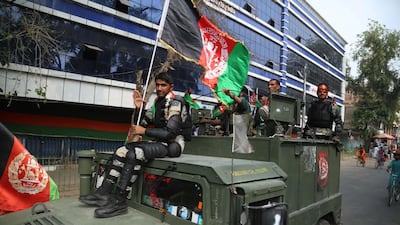What does independence mean in Afghanistan? For the residents of Kabul, the country's capital, there was little time to ask the question, as Independence Day began this morning under a hail of mortar fire. Several areas of the city were targeted by as yet unknown assailants.
Afghanistan has the unusual distinction of having never been colonised, but it celebrates an independence day nonetheless. The holiday marks the signing of a treaty between Afghanistan’s then king, Amanullah Khan, and Great Britain on August 19, 1919, though Afghanistan follows a variant of the Persian calendar that results in it falling on August 18 this year.
The treaty involved a commitment by Britain to stop interfering in Afghan affairs. In the presence of a British envoy, King Amanullah declared Afghanistan to be “entirely free, autonomous and independent, both internally and externally”. Since then, Afghanistan has marked 100 Independence Day celebrations. Less than half of them occurred outside the shadow of foreign-backed civil wars – yet they were celebrated nonetheless.

Even today, there is an awkwardness to Afghan Independence Day, with government buildings protected by foreign soldiers, and the common view among the public is that most political, tribal and military leaders’ strings are pulled from neighbouring capitals or the West.
So what does independence mean in Afghanistan?
To quote King Amanullah’s original declaration of independence, it ought to mean something that applies both “internally and externally”. In recent decades, much attention has been devoted to celebrating the dream – if not the reality – of autonomy from external forces.
Independence Day in the 1980s was celebrated by a Soviet-sponsored communist government, with celebrations emphasising independence from Western powers amid the Cold War. The 75th anniversary of Afghan independence, in 1994, was downplayed by the US-sponsored mujahidin government so that it wouldn’t overshadow the anniversary of the defeat of the communists.
It took several years for the Taliban, which came to power in 1996, to get into the Independence Day spirit. Its first Independence Day parade in 2001 banned clapping, music, women and, if video footage is anything to go by, possibly even smiling. “Afghanistan is the graveyard of invaders,” read a banner, in English.
Implicit in King Amanullah’s original emphasis on “internal independence”, however, was a desire for the country to not only take back control of its own affairs from external powers, but to be responsible for them. After all, what is the point of an independent Afghanistan if it cannot or will not look after its people.
Every Afghan government – from the monarchy to the communists to the mujahidin to the Taliban – operated with the same equation in mind: first take control of the country, then take responsibility for its citizens.
So what does independence mean in Afghanistan?
In 2020, it is difficult to say. The country’s independence is questionable at best. It is not in control of its affairs. Seventy-five per cent of public expenditure comes from foreign aid. Roughly half of the territory is in the hands of the Taliban, ISIS or other militant groups whose own expenditure is funded largely by foreign interests, too.
The only way out, the only way to even begin to take control back into the country's sovereign hands, is to end the war and consolidate a workable, national government. This relies on the Taliban and the Afghan government, who are meant to be in peace negotiations right now but have instead conjured their own respective reasons to delay them. But the success of those talks, when they finally do happen, will be built on a mutual understanding of what the state's responsibilities are to its people.
The old equation must be flipped on its head: Afghan leaders must first take responsibility before they can take back control. If today's Independence Day attacks, however, are anything to go by, neither the government nor the Taliban is prepared to do that.
Ten people, including four children, were wounded. “No one has claimed responsibility,” say the news reports.
And that is a popular refrain in the narrative of modern Afghanistan. Last week, a policewoman was dragged out of her home and shot dead. No one has claimed responsibility. On the same day, a parliamentarian and peace negotiator was shot in the arm while visiting a market with her sister. No one has claimed responsibility. In May, 40 people, including new-born babies, were killed in an attack on a maternity ward in Kabul. No one has claimed responsibility.
Last month, there were at least 125 deadly attacks against civilians, police officers and soldiers in Afghanistan. These range from bombs planted on minibuses to targeted assassinations of school teachers to entire families being wiped out by roadside bombs. In most of them, no one was caught. No one had to take responsibility.
There are, of course, rare occasions in which everyone wants to claim responsibility, though without actually taking it. On July 27, an Afghan army Black Hawk helicopter was shot down. The Taliban claimed to have shot the helicopter, and Afghan government officials claimed that their own technical issues caused it to crash. In instances like this one, responsibility for a death is somehow a face-saving measure. If only the mindset of responsibility was adopted in earnest rather than out of convenience.
So what does independence mean in Afghanistan?
The truth that must shape Afghanistan’s peace talks is that, for every deadly attack, every act of corruption, every foreign bribe and every failure to negotiate, everyone must take responsibility. An unwillingness to internalise that truth is the deadliest ammunition in a war that feels as though it will never end.
A culture of responsibility will not solve Afghanistan’s security problems or revitalise its economy – at least not right away. But it is the starting point for fostering the national cohesion that is badly needed if Afghanistan is to have a chance at prosperity, and if future Independence Days are to mean anything at all.
Sulaiman Hakemy is deputy comment editor at The National











